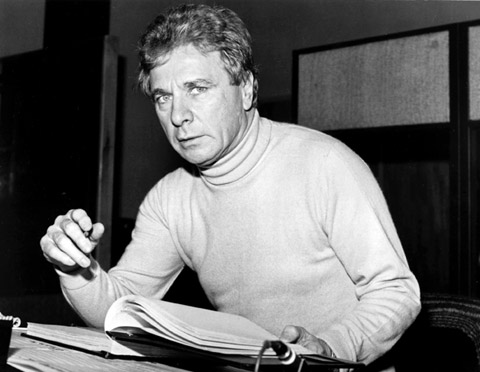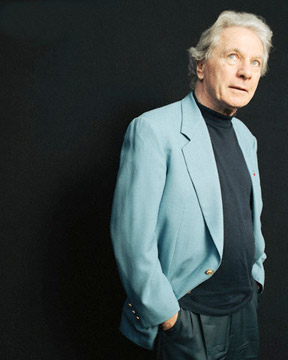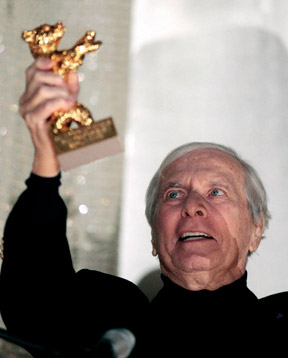

  |
|
|
||||||||||||||||||||||
|
OBITUARY... March 30, 2009 Maurice Jarre Dead at 84 Oscar-winning composer scored Doctor Zhivago, Lawrence of Arabia by Jon Burlingame  Three of his four scores for English director David Lean won Oscars: Lawrence (1962), Zhivago (1965) and A Passage to India (1984); Ryan's Daughter (1970) failed to receive a nomination but was the composer's personal favorite of the four. "Lara's Theme" from Zhivago became a worldwide hit, won a Grammy and remains one of the most-remembered movie love themes of all time. But Lean was only one of dozens of major directors who worked with the French-born composer over nearly half a century of work in movies and television. His list of nearly 180 scores, dating back to 1952, includes collaborations with John Huston, Alfred Hitchcock, William Wyler, Elia Kazan, Luchino Visconti, Fred Zinnemann, Rene Clement, John Frankenheimer, Richard Brooks, Volker Schlondorff and Peter Weir.  Maurice Jarre, 1999 The Lyon-born, Paris Conservatory-trained composer had been music director of the Theatre National Populaire and scored a number of French films throughout the 1950s, many for Georges Franju (including Eyes Without a Face, 1960). But it was his grand, sweeping music for Lawrence of Arabia that catapulted him into the front rank of composers for international cinema. "I was so lucky to work with great directors," he said, singling out Schlondorff's The Tin Drum, his films with Huston, and Frederic Rossif's documentary To Die in Madrid as other favorite assignments. "Even when the pictures were not great, it was still wonderful," he said. He did three with Huston (including The Man Who Would Be King, 1975), four with Frankenheimer (including The Train, 1964, and Grand Prix, 1966), five with Weir (including Witness, 1985, and Dead Poets Society, 1989) and one each with Hitchcock (Topaz, 1969), Wyler (The Collector, 1965), Clement (Is Paris Burning?, 1966), Kazan (The Last Tycoon, 1976), Visconti (The Damned, 1969), Brooks (The Professionals, 1966) and Zinnemann (Behold a Pale Horse, 1964). Asked what all those famous directors had in common, he replied with a single word: "Talent." Jarre's remarkably diverse output over half a century of film-scoring ranged from the balalaika-flavored Russian romance of Doctor Zhivago (his biggest commercial success) to the offbeat electronic soundscape of Witness, and majestic music for the gentle creatures of Gorillas in the Mist. Jarre's music added suspense to Topaz, terror to Fatal Attraction and charm to Ryan's Daughter. He was especially proud of his effective use of ethnic instruments to evoke exotic locales, partly because of his own background as a percussionist and his ongoing fascination with ethnomusicology. "I was always looking for new combinations of sounds and musicians who could play very strange instruments," he explained. So Jarre colored Huston's The Man Who Would Be King with the sarangi, an Indian lute; The Tin Drum with the fujara, a Slovakian shepherd's flute; Franco Zeffirelli's Jesus of Nazareth, with the santur, a Middle Eastern dulcimer; and the James Clavell miniseries Shogun, with the Japanese stringed koto and biwa – just a few of the countless examples throughout Jarre's lengthy filmography. Although orchestrally trained, Jarre became fascinated from an early age with electronic instruments as a way of adding new colors to his sound palette. He was using the eerie Ondes Martenot keyboard as far back as the 1950s and, during the 1980s, used synthesizers on numerous scores from The Year of Living Dangerously to The Mosquito Coast. Jarre's last project was Jon Avnet's 2001 miniseries Uprising. "The biggest directors I worked with are gone," he said sadly. "And the fashion now is very quick-cut, so fast that you don't even see what is going on. Also, there is no music – it's a kind of complement of sounds, more like clang-clang-clang. We don't know if they are sound effects or music."  Maurice Jarre accepts the Golden Honorary Bear at the 59th Berlin Film Festival. The composer divided his time between homes in Malibu and Switzerland (near St. Moritz), where he occasionally composed new pieces for the concert hall. But even in his concert music, he still strove for that elusive quality: a memorable theme. "Life without music is a mistake," he says. "And music without a real theme is a mistake." A warm, self-effacing man, Jarre often joked about why he took so many assignments – often for less-than-stellar movies – during the '60s, '70s and '80s: He had three ex-wives who demanded alimony, and Jarre was constantly racing to keep up the payments. His fourth wife Fong, whom he met while working in Southeast Asia on The Year of Living Dangerously, survives. Also surviving are his son, electronic-music artist Jean Michel; a daughter, Stephanie; a sister, three grandchildren and a great-grandchild. Services will be private. ©2009 Jon Burlingame |
Search
Past Features
|